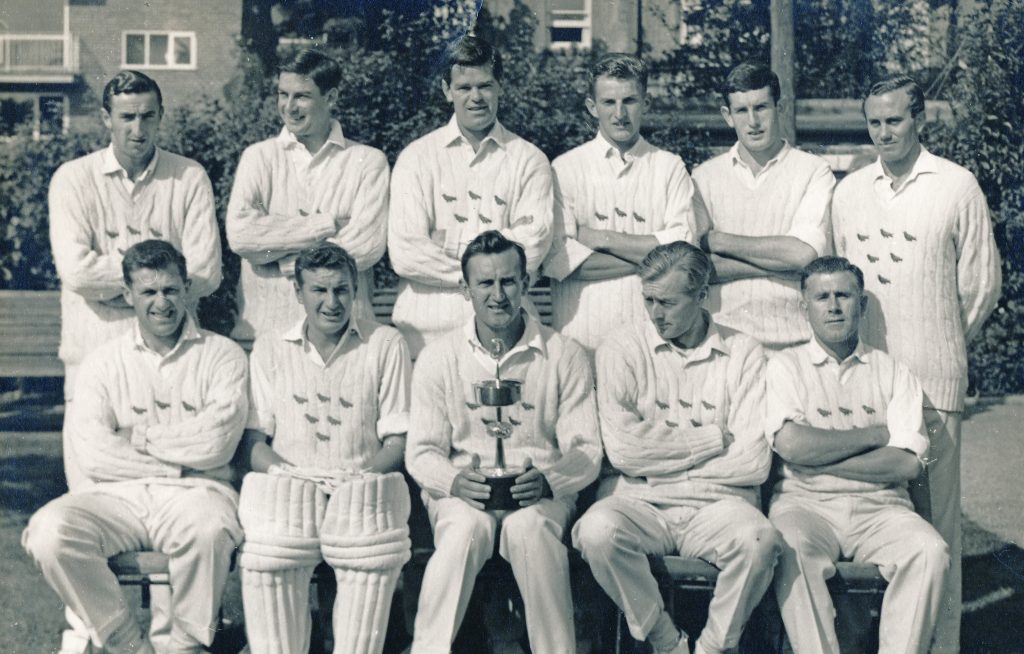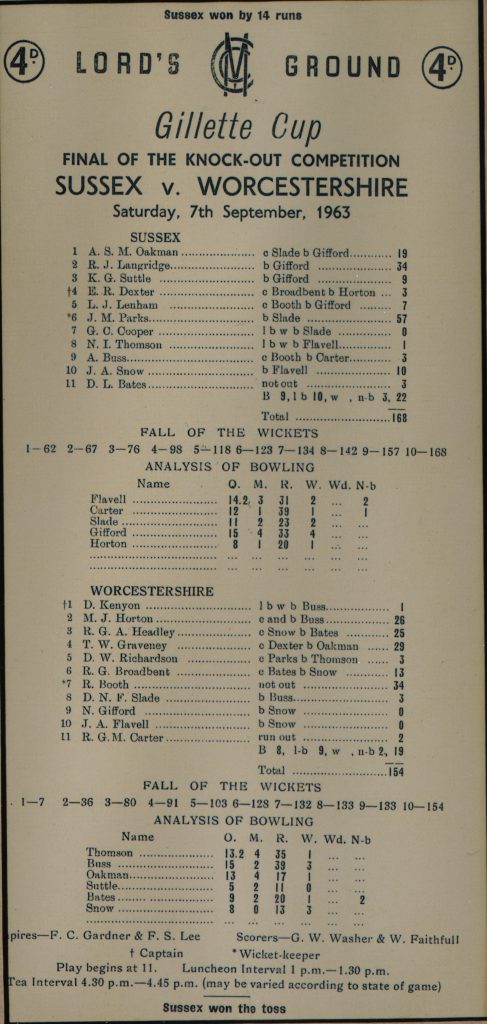1963 Gillette Cup Final

The first ever limited-overs final
1963 was a memorable year for cricket. There was a gripping Test series against a superb West Indian side and following the abolition of the amateur/professional divide the previous winter, all players simply took to the field as cricketers. However, Sussex were at the heart of another development which was to have a huge impact on cricket around the world.
By the early 1960s County Cricket was in a financial crisis. The halcyon days of the late 1940s, during which people who had been starved of cricket during the war crammed county grounds up and down the country, were long gone. Cricket attendance had decreased from more than two million in 1947 to less than a million in 1963. County clubs were haemorrhaging money collectively losing £120,000 per year (over £2,000,000 now). Something needed to be done .
£6,500 to become County Cricket’s first sponsor
The idea of a county knock-out cup had first been discussed as long ago as 1873 but there had been little interest. Then in 1962 the secretary of Leicester, Mike Turner, managed to persuade three other countries to join in a small knock-out competition. This was technically the first county knock-out cup but the following year, 1963, the MCC launched a competition for all the then 17 county clubs. It was limited to 65 overs per side: long by today’s standards but innovative at the time. It was sponsored by the razor company Gillette who paid the sum of £6500 to become the first ever sponsor of County Cricket.
Initially, there had been some concern as to whether the competition would be a success. But the public loved it, and attendances grew as the competition developed. For the first time spectators got to see a match played from beginning to end in a single day, with both sides batting and bowling.
In Sussex’s first game against Kent at Tunbridge Wells, Ken Suttle had scored 104. In the second round County Champions Yorkshire had been beaten with Jim Parks scoring 90, and in the semi-final against Northants at Hove, watched by no less than 15,000 spectators, Ted Dexter scored 115 in a partnership of 160 in 95 minutes with Jim Parks.
A very even game
The final at Lords against Worcestershire was a sell-out. In the earlier rounds Worcestershire had overcome Surrey and Glamorgan, and then their fast bowler Jack Flavell (who had once taken nine wickets against Sussex) single-handedly beat Lancashire with his six for 14.
2 September 9th 1963, a dull day but nevertheless Cup Final Day, was something of a carnival atmosphere as Sussex faced Worcestershire. The majority of the 25,000 crowd had been brought to Lord’s by coaches and there was a feeling that the day would be a piece of history.

Ted Dexter won the toss in what was predicted to be a close game between two evenly matched sides. On a soft pitch Sussex’s free-scoring batsmen failed to make the progress expected by their supporters. Dexter was dismissed for just three, bringing forth loud cheers from the Worcestershire supporters. The slow bowlers Gifford and Slade dominated the batting, and only Parks, with 57, was able to stay at the crease for any length of time to ensure that Sussex reached 168.
No-one could dominate the bowling
The dull weather persisted throughout the day and although Worcestershire needed only 2.5 runs an over to win, it was going to be a close game. Buss trapped the Worcestershire captain Kenyon for lbw early on and although Horton, Headley and Graveney managed to get in to the 20s, no-one was able to dominate the bowling. All of Sussex’s bowlers took wickets, which tumbled at regular intervals. With the 21-year-old John Snow taking three quick wickets, the onus was on Worcestershire to win the game. The wicketkeeper Roy Booth and the last man Bob Carter put on 21 runs, and were just 14 runs short of the Sussex target when Carter was run out in the murky gloom. Ted Dexter received the Gillette Cup from the MCC President Lord Nugent in front of the pavilion with the Sussex supporters singing themselves hoarse with ‘Sussex by the Sea’. The Man of the Match award though went to Norman Gifford for taking four wickets for 33. Sussex had a well-balanced team and a captain who understood that over sixty-five overs, a team needed to build an innings and that defensive fields had a part to play in one-day competitions. Over the next few years Sussex would gain a reputation as the one-day specialists, winning the following year and 1978, and finishing as runners-up in 1968, 1970 and 1973.